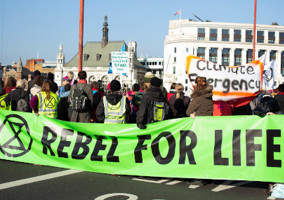Charities could gain from the awareness raised by civil disobedience and direct action groups, according to a report from nfpResearch.
The report, Good Cop, Bad Cop: How environmental charities can take advantage of direct action, looks at the impact of direct action climate groups such as Extinction Rebellion and Just Stop Oil on the environmental charity sector.
It highlights that though charities are not likely to become involved in direct action or civil disobedience tactics, they can capitalise on the awareness for their aims generated by such groups.
“The actions of social movements who engage in these strategies can be beneficial in heightening awareness and creating political opportunities for charities to seize upon,” it reads.
The report says “the criminalisation of climate protest threatens to splinter and divide the environmental movement” so finding points of intersection is key to maintaining a strength of voice.
“Furthermore, with the government pursuing increasingly draconian legislation to criminalise climate protest, charities must find inclusive ways to bring the public into this debate,” it adds.
The report states direct action groups are “born from a sense of frustration with charities” though notes “charities face ongoing scrutiny from the Charity Commission” on certain fronts.
“Charities are certainly recognised as working within a number of constraints” the main one being that they keep to charity law and avoid actions or statements that could be deemed party political.
‘Charities should not be afraid to hold the government to account’
The recommendations of the report for charities include that they need to be bolder in their interactions with the government.
In addition, the report suggests that by finding common messaging with direct action groups, outside of their tactics, broad appeal can be achieved with a wide demographic of voters.
They could do so by sharing political aims or finding a common message that is endorsed by a range of organisations, the report suggests.
It adds: “Charities should not be afraid to hold the government to account. Environmental charities have significant resources at their disposal and often rely on vast membership bases to support their initiatives. This gives them an important advantage over direct action groups in how they are able to bring accountability to the government.”
‘Charities and direct action groups should synchronise their efforts’
Tim Harrison-Byrne, managing director at nfpResearch and co-author of the report, said: “Direct action advances the conversation we see around climate change and challenges the public and legislators to take notice.
“While direct action groups may generate new attention for environmentalism, it falls to charities and their established place in the political sphere to push for comprehensive legislation that fully addresses the scope of the climate crisis.
“Charities and direct action groups should synchronise their efforts and work towards unified messaging with maximum reach.”
Related Articles












